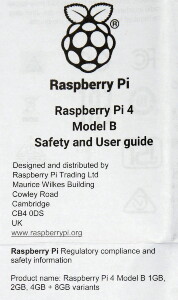CrimsonKnight13
Lord Stabington of [H]ard|Fortress
- Joined
- Jan 8, 2008
- Messages
- 8,435
How have you found it? I tried pricing out all the pieces to build a surveillance NAS with it, the nas case, 5a power supply, fans, adapters, etc, and it's getting close to the price a really cheap pc. It's still quite a bit cheaper than a pc, but not as cheap as I'd like for the compromises I'd be making. Unfortunately most of these SBC's don't have sata ports or a case to house 3.5" drives. This rockpro 64 actually does (sorta the sata ports are an adapter)
I ordered it through https://store.pine64.org/
Prices aren't exactly cost saving but I've found good value with it. For your own project, that's all up to how you want to go about it & how much you want to spend.
![[H]ard|Forum](/styles/hardforum/xenforo/logo_dark.png)
